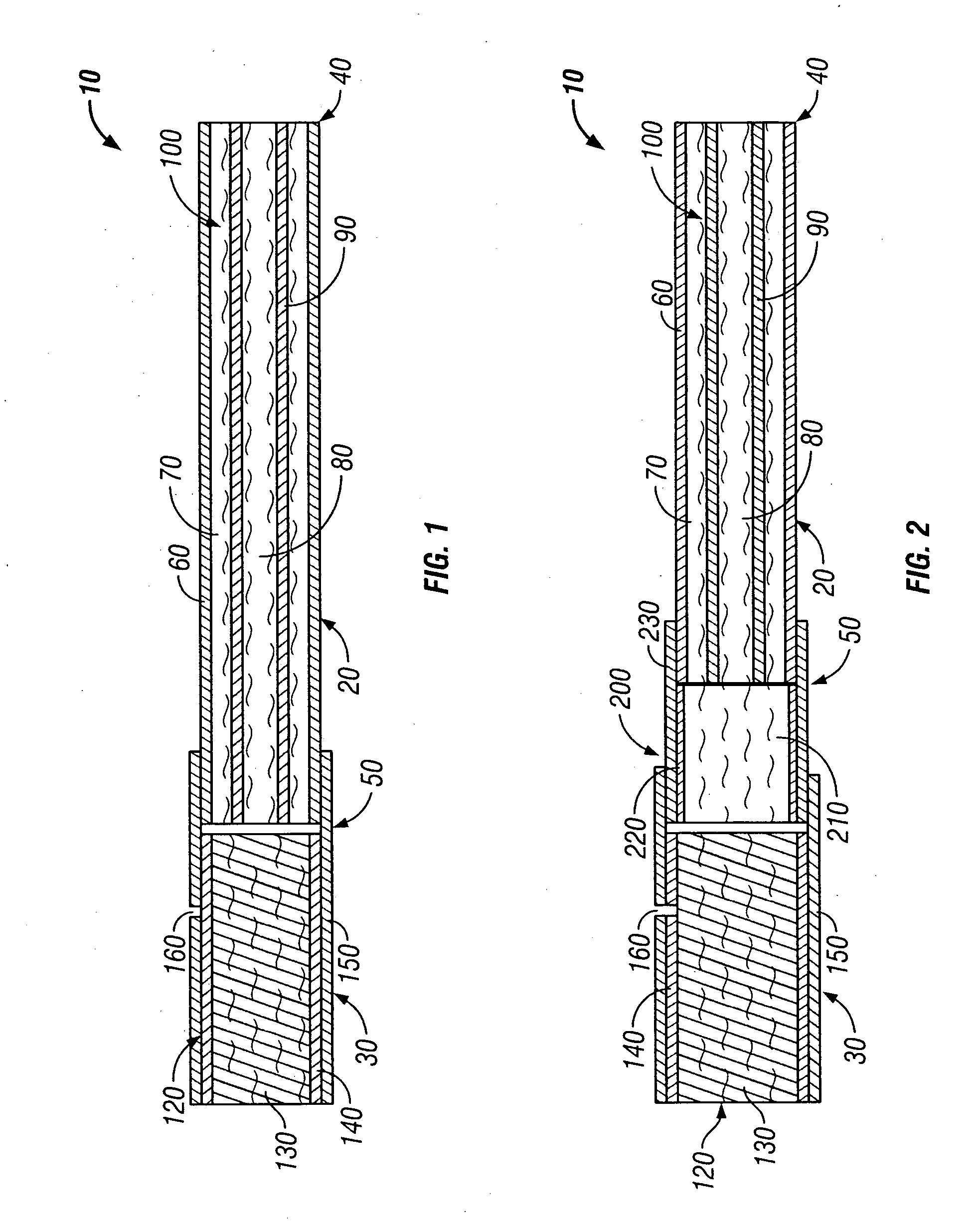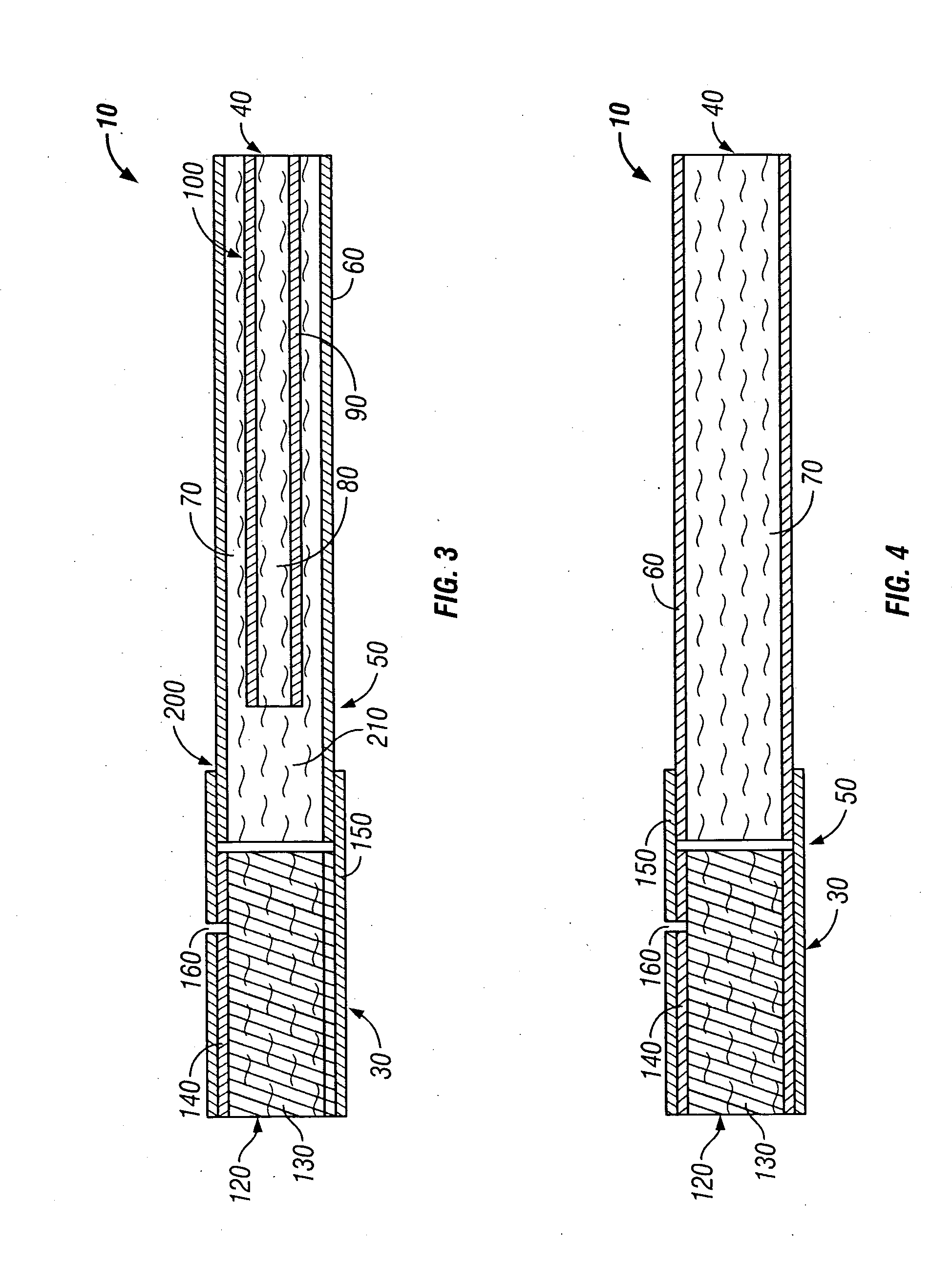Smokable rod for a cigarette
a cigarette and smoking rod technology, applied in the field of tobacco products, can solve the problems of not receiving widespread commercial success for smoking articles that employ tobacco substitute materials, and smoking articles that employ tobacco substitute materials, and achieve the effects of not easily dislodged for smoking, not overly flakey, and acceptable shape and siz
- Summary
- Abstract
- Description
- Claims
- Application Information
AI Technical Summary
Benefits of technology
Problems solved by technology
Method used
Image
Examples
example 1
[0098] A cigarette of the general type described previously with reference to FIG. 1 is provided. The cigarette has a total length of about 84 mm. The cigarette possesses a smokable rod having a length of about 57 mm and a filter element having a length of about 27 mm. When viewed end on, the cigarette has a generally circular cross-sectional shape. The circumference of the smokable rod is about 25 mm.
[0099] The inner rod having a generally cylindrical shape is produced by wrapping the smokable material in a wrapping material. The wrapping material circumscribes the smokable material such that the wrapping material and smokable material each extend along the total length of the rod. The wrapping material provides the outer longitudinal surface of the inner rod, and due to the tubular shape of the wrapping material, each end is open to expose the smokable material within that rod. The rod has a length of about 57 mm and a circumference of about 14 mm.
[0100] The wrapping material of...
example 2
[0111] A cigarette of the general type described previously with reference to FIG. 1 is provided. The cigarette has a total length of about 84 mm. The cigarette possesses a smokable rod having a length of about 57 mm and a filter element having a length of about 27 mm. When viewed end on, the cigarette has a generally circular cross-sectional shape. The circumference of the smokable rod is about 25 mm.
[0112] The inner rod having a generally cylindrical shape is produced by wrapping a filler material within a wrapping material. The wrapping material circumscribes the filler material such that the wrapping material and filler material each extend along the total length of the rod. The wrapping material provides the outer longitudinal surface of the inner rod, and each end is open to expose the filler material within that rod. The rod has a length of about 57 mm and a circumference of about 14 mm.
[0113] The wrapping material of the inner rod is a 17 mm wide cigarette paper wrapper of...
example 3
[0122] A cigarette of the general type described previously with reference to FIG. 2 is provided. The cigarette has a total length of about 84 mm. The cigarette possesses a smokable rod having a length of about 57 mm and a filter element having a length of about 27 mm. When viewed end on, the cigarette has a generally circular cross-sectional shape. The circumference of the smokable rod is about 25 mm. The cigarette is produced using the same outer blend and cigarette paper outer wrapper described previously in Example 1. However, except the longitudinally extending cavity produced for the tobacco of the inner core is about 50 mm in depth. As such, there is provided a cylindrical segment of filler material extending about 7 mm along the length of that rod. The cylindrical segment of filler material is positioned adjacent to the filter element.
[0123] The inner smokable material is a reconstituted tobacco material manufactured using the paper-type reconstitution process employed by R...
PUM
| Property | Measurement | Unit |
|---|---|---|
| Fraction | aaaaa | aaaaa |
| Fraction | aaaaa | aaaaa |
| Fraction | aaaaa | aaaaa |
Abstract
Description
Claims
Application Information
 Login to View More
Login to View More - R&D
- Intellectual Property
- Life Sciences
- Materials
- Tech Scout
- Unparalleled Data Quality
- Higher Quality Content
- 60% Fewer Hallucinations
Browse by: Latest US Patents, China's latest patents, Technical Efficacy Thesaurus, Application Domain, Technology Topic, Popular Technical Reports.
© 2025 PatSnap. All rights reserved.Legal|Privacy policy|Modern Slavery Act Transparency Statement|Sitemap|About US| Contact US: help@patsnap.com


